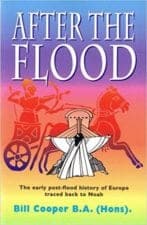This is a book I had never heard of, but a kind fellow sent me a copy on the supposition that it would be the kind of thing I liked. Having read it, his guess was right on the money. I really enjoyed the book, and the leads that the book provided. It is called After the Flood by Bill Cooper.
Caveat: after I finished it, I rated it at five stars on Goodreads, which then floated off to Facebook, and another friend almost bought it but noted a quotation from the Rig Veda that seemed off to him, and so he tracked that down and found that it was a swing-and-a-miss citation. So take note.
But I still really enjoyed the book. There are some interesting by-paths in some of the chapters (e.g. historicity of Beowulf, and citations about dragons in medieval documents), but the main thesis of the book has to do with matching ancient European king lists (Celtic, Norse, etc.) up with the genealogies found in Genesis. Bill Cooper’s thesis is not just that the early Europeans were descended from Japheth, but also that they knew it, and traced their king lists back to Japheth.
Lists of this sort are most famous through their appearance in Geoffrey of Monmouth, where they are routinely dismissed by modernist historians. Bill Cooper, the author of this book, isn’t having any, and produces some good arguments for paying closer attention to these king lists. Not only does he argue that we should, but he does so himself. Doesn’t the Bible commend endless genealogies somewhere?
Regardless of the problem mentioned above, this book is really worthwhile in that it points the way to a number of sources that we should be a lot more familiar with. On top of that, for any strict creationists, we have to embrace some form of this understanding of European history. As it turns out, there is such a written history, one that we should know a lot more about.


